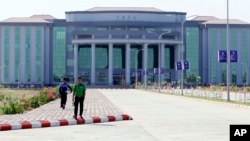Two years after Myanmar’s State Counsellor Daw Aung San Suu Kyi promised to make the country’s 70-year civil war a priority in her leadership, there has been little to celebrate about the peace process.
With the third Peace Conference due to take place within the next month, and amid fresh tensions between the Myanmar Army and ethnic armed groups, few observers are confident any significant progress will be made in the months ahead.
In January 2016, weeks before the National League for Democracy took power from the military-linked government, Aung San Suu Kyi said that her administration would make bringing peace to the country their number one priority.
"The first responsibility of the government is to build peace," she said in a speech made shortly after the NLD’s resounding election victory in November 2015. "We will organize an effective peace conference to improve the recent ceasefire agreement and we will urge widespread participation."
The treaty she referred to was the Nationwide Ceasefire Agreement signed in November 2015 by eight ethnic armed groups, although not by some of the larger groups operating in the country’s north.
Two peace conferences – labelled the 21st Century Panglong Union Peace Conference – have been held under the NLD, with a third due to take place at the end of this month. But there are questions about how effective the meetings have been.
Neither event has collectively included all of Myanmar’s ethnic armed groups, and civil society groups have regularly complained that their concerns are not listened to at the conferences.
Perhaps the most substantial process came at the second UPC, held in May 2017, when representatives from the then-recently formed Federal Political Negotiation and Consultative Committee – which rejects the NCA and is led by the United Wa State Army – attended and met with senior government officials.
Since then, there has been little meaningful action on the peace process, and the country’s decades of civil war appears no nearer to being brought to an end.
"As the country’s de facto] leader, Aung San Suu Kyi has a lot of political capital, but both the military and the NLD have to be magnanimous in order to achieve peace," said Yangon-based political analyst Khin Zaw Win. "The military is crucial to the peace process; but I don’t think [an end to the process] will happen soon."
The government has said it plans to hold a third UPC in January, but a final date has yet to be confirmed.
"The NCA signatories and government should focus negotiations on the remaining federal principles to have a productive outcome at the next peace conference," Min Zaw Oo, founder of the Myanmar Institute for Peace and Security (MIPS) and advisor to the government's Peace Commission, told VOA by email. "Both sides need to have a series of pre-negotiation sessions and informal talks before they sit down for actual negotiation."
New conflicts
New fighting, particularly in the country’s restive north, has also raised concerns of ever-growing distrust between the ethnic armed groups operating there and the Myanmar Armed Forces, known as the Tatmadaw.
Conflict between the Tatmadaw and the Kachin Independence Army, an FPNCC member, continued in December with 14 armed incidents taking place that month, according to data collected by the Myanmar Institute for Peace and Security.
The Myanmar Army captured more than a dozen KIA positions between November and January, according to a Tatmadaw news release.
"The Tatmadaw’s capture of these KIA bases along the Kachin-Shan border will deny the EAO [ethnic armed organization] another valuable revenue resource generated from logging exports to China," MIPS said in a December briefing.
Fresh fighting also broke out between the Tatmadaw and the Ta’ang National Liberation Army, a KIA ally, in December, and MIPS said fighting with the groups is likely to continue this year.
In 2017, it was reported that members of the non-signatory bloc the United Nationalities Federal Council were considering signing the NCA, which the government and military regard as crucial to moving the peace process forward. Among those considered most likely to sign were the New Mon State Party and the Karenni National Progressive Party.
However in December, four KNPP soldiers were killed during a confrontation with Tatmadaw troops. The KNPP has accused the Myanmar Army of executing the soldiers, while the military argues the incident occurred after a gunfight. Earlier this month, local authorities took action against five Kayah youths who held protests about the incident.
Shwe Myo Thant, General Secretary of the KNPP, told VOA the group had still not decided whether it would sign the NCA, or attend the next UPC.
"There can be a lot of impacts on the NCA because of what happened. The peace process is still going on, but there are still many fighting in ethnic areas. We haven’t decided yet [whether to attend]. Those who haven’t signed the NCA are not able to discuss, and we don’t want to be puppets just sitting there. This problem has had an impact on the peace process."
Aung Naing Soe in Yangon contributed to this report




